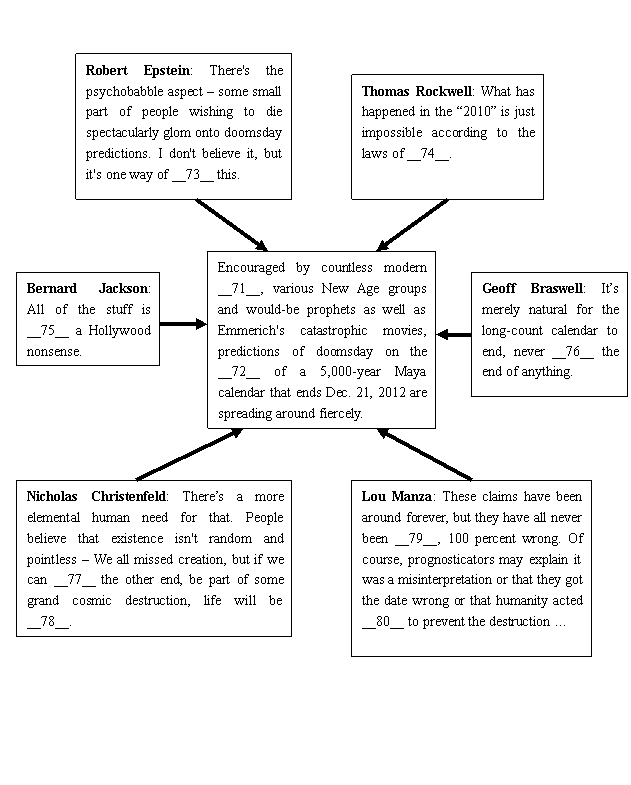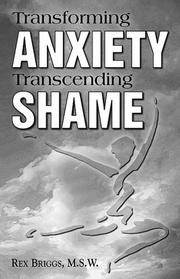题目内容
Experts debunk Maya doomsday(末日) predictions -- But that hasn't stopped books, movies from cashing in.
If the ancient Maya and filmmaker Roland Emmerich are correct, the apocalypse(大灾变) will happen very fast, maybe quicker than his new 2½-hour movie.
Predictions of global ruination are rippling around the globe with seismic(地震的) force, all loosely based on a 5,000-year Maya calendar that ends Dec. 21, 2012. Countless Web sites and blogs anticipate(预料) the end of days, as do various New Age groups and would-be prophets(预言者) offering guidance and how-to tips. On Amazon.com , you can read hundreds of book titles combining the year 2012 with terms such as “apocalypse,” “catastrophe” and “end of the world.”
As always, doomsday sells — and a lot of people are buying it.
“There's the psychobabble(心理呓语) aspect,” said Robert Epstein, former editor of Psychology Today magazine and a lecturer at the University of California San Diego. “It's the Sigmund Freud/death wish idea: People glom onto(对…感兴趣) doomsday predictions because there's some small part of them that wants to die, and die spectacularly(壮观的). I don't believe it, but it's one way to look at this.”
It's Emmerich's way. The German director specializes in wreaking havoc on an epic scale, from climatic cataclysm in 2004's “The Day After Tomorrow” to angry aliens and reptiles in “Independence Day” and “Godzilla.” In “2012,” he finishes the job.
The digitized disasters of “2012” are oversized, overwrought and sometimes literally over the top, as when a humongous tsunami washes over the Himalayan mountains, whose average height exceeds 20,000 feet. Meanwhile in Los Angeles, a 10.5-magnitude earthquake — a temblor at least 30 times more powerful than any real quake ever recorded — yanks the city apart like a giant zipper, sending chunks sliding into the Pacific Ocean.
That's not physically possible, of course. Nor is a 10.5-magnitude quake, said Thomas Rockwell, a geologist at San Diego State University. To generate that much energy, “you'd need a rupture that extends all around the planet.”
All of that other stuff “is pure Hollywood bunk,” said Bernard Jackson at the UCSD Center for Astrophysics and Space Sciences.
Entertaining, though, unless you happen to believe the Maya really predicted the end of the world. They didn't, said Geoff Braswell, a UCSD anthropologist. The long-count calendar doesn't signal the end of anything except the end of that particular calendar. “It's just like a car odometer. Unfortunately, hardly anybody reads ancient Mayan. Modern media hype(骗局), on the other hand, is almost inescapable.
Nicholas Christenfeld, a professor of psychology at UCSD, suggests a more elemental human need. Being swallowed by the Earth or incinerated in a giant fireball “fits neatly with the idea that people want to believe there's a plan, that existence isn't random and pointless,” Christenfeld said.
“We all missed creation, but if we can bear witness at the other end, be part of some grand cosmic destruction, that gives life meaning,” he said.
It helps, too, not to think very hard about the facts, said Lou Manza, a professor of psychology at Lebanon Valley College in Annville, Pa. “These claims have been around forever, and they have all been false, 100 percent wrong,” Manza said.
Of course, prognosticators(预言者, 占卜者) usually have an explanation for that, Christenfeld said.
“They might say it was a misinterpretation,” he said. “They got the date wrong. They might claim humanity acted in time to prevent the destruction. Or faith came to the rescue because people believed something bad was going to happen, it didn't have to happen.”

71. media 72. basis 73. viewing 74. nature 75. purely
76. signaling 77. witness 78. meaningful 79. true 80. timely

 名校课堂系列答案
名校课堂系列答案首先请阅读下列书城畅销书的封面及基本信息, 第61-65题是这些书的简要内容,请匹配相关的书名。
| A.Foreword | |
 | The Antidepressant Survival Guide: Beat the Side Effects of Your Medication by Robert J. Hedaya, M.D, Robert J. Hedaya, M.D., is a clinical professor of psychiatry at Georgetown University Hospital's Department of Psychiatry. Motto: Live well. |
| B.How Fear Limits Us | |
 | On Becoming Fearless... in Love, Work, and Life by Arianna Huffington Arianna Huffington was raised in Greece by her fearless mother. She has written this book for her two daughters in the hope that they will lead fearless lives. Motto: Overcome the obstacle, get over the next hill. |
| C.Determination: How to Set Goals and Go After Them | |
 | Fight Your Fear and Win by Don Greene, Ph.D. Don Greene, Ph.D., was a nationally ranked high school diver. He was the sports psychologist for the U.S. Olympic Diving Team. Motto: Determination is drive. |
| D.The Anger Business | |
 | Anger : The Misunderstood Emotion by Carol Tavris, Ph.D. Carol Tavris, Ph.D., was senior editor. She now teaches from time to time in the department of psychology at UCLA Motto: Reduce Stress! |
| E.In the Presence of Danger | |
 | The Gift of Fear by Gavin de Becker Davin de Becker, America’s leading expert on violence, is the bestselling author of the Gift of Fear: Survival Signals. Motto: Trust and act on our straight instincts. |
| F.Moving from Fear to Freedom | |
 | Transforming Anxiety, Transcending Shame by Rex Briggs, M.S.W. REX BRIGGS, M.S.W., has been a selected speaker at the National Anxiety Disorders Association of America’s conferences since 1986. Motto: Weaken anxiety |
下面是这些书的简要内容,请匹配相关的书名。
【小题1】This useful and popular book shows that if you are gone broke and lose love, please hold yourself back. If you look fat, just face it calmly. If you are in survival thinking, the most important is that you get rid of all the difficulties in front of us, life will be safe, perfect. If your daughters are to take their rightful place in society, they must become fearless.
【小题2】In this book, the author calls the nation’s leading experts on violent behavior, and shows you how to spot even tiny signs of danger before it’s too late. Most violent acts are unpredictable. It points out that true fear is often a signal that can save your life. Believe the threat of violence surrounds us every day. But we can protect ourselves by straight judgment.
【小题3】This book based on his years of clinical experience. It says about twenty-five million Americans take medicine to avoid depression. Despite the advances in the treatment of depression in recent years, many patients, even with the best medical care, feel that they are not living rich and fulfilling lives. This book will direct you how to survive well.
【小题4】This interesting book tells us that annoyance is as much a political matter as a biological one. And anger is a definite message: Pay attention to me. I don’t like what you are doing. Restore my pride. You’re in my way. Give me justice. This book suggests that when you’re angry, just let it right out.
【小题5】This valuable book states that nervousness has become a constant factor in today’s society like a sign of the times, but it is sometimes difficult to recognize the effects of anxiety on our mental health. The only way to feel better about ourselves is to go out and do it.
Zhu Haoyu, 18, a history major, wears his iPod everywhere on campus. The freshman has it going out for a walk, visiting the library or lying in bed. However, he found that his habit is like displaying a big “Do not disturb ”sign for himself.
As time slips away, he has begun to regret not having conversed much with his peers around . “As I put the little buds (耳机) into my ears, I’m immersed in a universe of my own, forgetting all troubles in the real world,” said Li.
The MP3 player is one of a number of gadgets (小玩意)—starting with the Sony Walkman, which led to the iPod, iPhone and iPad —that give people the ability to shut themselves off from world around them.
Youngsters delight in handset (手持的) technology. In public, students chat on their cell phones, stopping only to talk briefly to friends. On buses or trains it’s common to see youngsters with PlayStations instead of playing poker or sharing jokes or games. And during airline flights, people watch episodes (连续剧) of US TV dramas on their iPads, rather than talking.
The BBC News magazine recently published an article saying that headphone wearing culture is making us anti-social. “Half of humankind is wired to a parallel universe that leaves them ignoring their surroundings and fellows,” wrote Tom de Castella.
Actually, it’s a decade since Apple unveiled the iPod, which promised “1,000 songs in your pocket”. In 2007 more than half of Western residents were using an iPod or MP3 player.
Entertainment is on offer in all surroundings, not just at home. But in the meantime, it has created barriers between us. Many people subscribe to the view that the headphone culture is creating a “spoilt, selfish generation that lacks civic(公民的)culture”.
However, many users of portable MP3 players argue that the device, as a mind drug, helps them relieve stress by escaping for a while. It is also said to be able to help some students concentrate on work or study. “If you want to get away from the hucksters (小贩) on the way, just start listening to your player,” said Liu, a freshman. “They do not approach people with headphones on.” This might also mean he’s blocking those who want to ask him for the directions.
Experts, however, say that short contacts or mini conversations with strangers are helpful to our mind. Many experts warn that it is dangerous to lose touch with people in our lives.
1.Zhu Haoyu found that his wearing the iPod .
|
A.disturbed others |
|
B.made it easy for him to keep in touch with others |
|
C.made it easy for him to visit the library |
|
D.made others unwilling to talk to him |
2.The underlined word “immersed” can be replaced by .
|
A.lost |
B.involved |
C.engaged |
D.interested |
3.What is the main idea of the fourth paragraph?
|
A.Students are always busy chatting on their cell phones in public. |
|
B.Young people are fond of portable listening or visual devices. |
|
C.Young people like to watch US TV dramas on their iPads. |
|
D.People like to enjoy the networking. |
4.Which of the following is not true?
|
A.Headphone wearing culture makes people ignore their surroundings and fellows. |
|
B.Apple released the iPod ten years ago. |
|
C.There are still many people support the headphone culture. |
|
D.It’s dangerous to have conversations with strangers. |
5.What is the writer’s attitude towards the headphone culture ?
|
A.Agreeable. |
B.Critical. |
C.Doubtful. |
D.Neutral. |
 The
Antidepressant Survival Guide: Beat the Side Effects of Your Medication
The
Antidepressant Survival Guide: Beat the Side Effects of Your Medication On
Becoming Fearless... in Love, Work, and Life
On
Becoming Fearless... in Love, Work, and Life Fight
Your Fear and Win
Fight
Your Fear and Win Anger :
The Misunderstood Emotion
Anger :
The Misunderstood Emotion The
Gift of Fear
The
Gift of Fear Transforming
Anxiety, Transcending Shame
Transforming
Anxiety, Transcending Shame